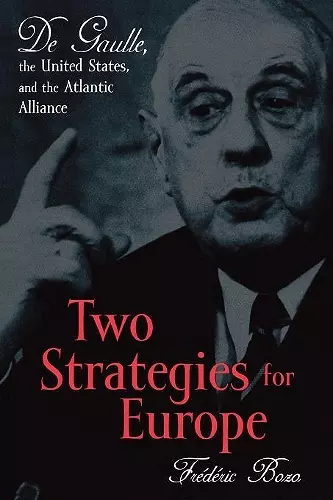Two Strategies for Europe
De Gaulle, the United States, and the Atlantic Alliance
Frederic Bozo author Susan Emanuel author
Format:Paperback
Publisher:Rowman & Littlefield
Currently unavailable, and unfortunately no date known when it will be back

This timely book explores the often stormy French-U.S. relationship and the evolution of the Atlantic Alliance under the presidency of Charles de Gaulle (1958–1969). The first work on this subject to draw on previously inaccessible material from U.S. and French archives, the study offers a comprehensive analysis of Gaullist policies toward NATO and the United States during the 1960s, a period that reached its apogee with de Gaulle’s dramatic decision in 1966 to withdraw from NATO’s integrated military arm. This launched the French policy of autonomy within NATO, which has since been adapted without having been abandoned. De Gaulle’s policy often has been caricatured by admirers and detractors alike as an expression of nationalism or anti-Americanism. Yet Frederic Bozo argues that although it did reflect the General’s quest for grandeur, it also, and perhaps more important, stemmed from a genuine strategy designed to build an independent Europe and to help overcome the system of blocs. Indeed, the author contends, de Gaulle’s actions forced NATO to adapt to new strategic realities. Retracing the different phases of de Gaulle’s policies, Bozo provides valuable insight into current French approaches to foreign and security policy, including the recent attempt by President Chirac to redefine and normalize the France-NATO relationship. As the author shows, de Gaulle’s legacy remains vigorous as France grapples with European integration, a new role within a reformed NATO, and relations with the United States.
Bozo, a top French scholar of foreign policy and strategic affairs, has written a masterful account of the intricate issues that have plagued Franco-American relations for so long. * Foreign Affairs *
[A] fine monograph. . . . Although the strength of the book is its explication of Gaullist politics, Bozo never loses sight of the American perspective or the context of Cold War developments. * CHOICE *
This is a well-researched and well-written account of Franco-U.S. and Franco-Alliance relations under de Gaulle, drawing on interesting archival material and proffering a valuable French perspective on an issue-area still, in general, inadequately comprehended. This sympathetic translation into English should be welcomed. * International Affairs *
For students or scholars trying to probe the causes of the Franco-American rift of the 1960s, or researchers trying to establish what has been recently been written on NATO doctrine or de Gaulle in French, [this book] is an excellent starting point. . . . [A] stimulating and valuable exercise in comparative archival study which will be of interest to both specialists in U.S. foreign policy and those concentrating on Western European diplomacy. * H-Net: Humanities and Social Science Reviews Online *
The prose is clear, the pace is brisk, the scholarship reliable. Bozo provides a thoughtful exposition of de Gaulle's challenge to the United States. * The International History Review *
Splendidly researched and written. The book is a major contribution to our understanding of de Gaulle's diplomacy and of NATO politics. Written from the perspective of a French scholar with an excellent knowledge of U.S. policy, it would appeal to the general public concerned with U.S.-European relations, as well as to the academic community. -- Stanley Hoffmann
This is a valuable book from a French perspective which looks at the role of NATO in terms other than the essential and unquestionable rock of Western defence and Atlanticism. * Millennium: Journal of International Studies *
ISBN: 9780847695317
Dimensions: 227mm x 149mm x 17mm
Weight: 399g
304 pages